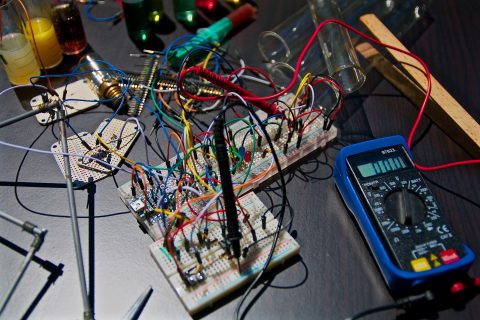Electrical and Computer Engineering (MEng)
Program overview
The Master of Engineering in Electrical and Computer Engineering is a course-based program designed to enhance the knowledge, design skills and presentation abilities of practicing engineers. This program combines practical course work with the option to complete one or more projects.
Program structure
Degree Requirements
The requirements described here are in addition to the general degree requirements for the Master/Magisteriate in Engineering (MEng) .
Fully-qualified candidates are required to complete a minimum of 45 credits.
Please see the Engineering Courses page for course descriptions.
Electrical and Computer Engineering MEng (45 credits)
| 5 | credits from the Topic Area E09 - Professional Leadership Skills |
| 20 | credits selected from the Concentrations for the Electrical and Computer Engineering MEng list |
| 20 | credits chosen from the Topic Areas for the Electrical and Computer Engineering MEng |
Concentrations for the Electrical and Computer Engineering MEng (20 credits)
Students must select one of the concentrations listed below which are composed of one, two or three topic areas for Electrical and Computer Engineering.
Concentration A: Hardware and Software Computing Systems
Concentration B: Control Systems and Power Engineering E45 - Electrical Power Engineering Concentration C: Communications and Signal Processing E42 - Communication Systems and Networks
Concentration D: Devices, Microelectronics and Electromagnetics E43 - Micro-Devices and Fabrication Processes E44 - Fields, Waves and Optoelectronics F03 - Microelectronic Systems
|
Topic Areas for the Electrical and Computer Engineering MEng (20 credits)
| 20 | credits chosen from the following Topic Areas: E42 - Communication Systems and Networks E43 - Micro-Devices and Fabrication Processes E44 - Fields, Waves and Optoelectronics E45 - Electrical Power Engineering F03 - Microelectronic Systems ELEC/COEN courses in E02 - Developments In Engineering Students may take a maximum of 8 credits from the following courses: |
This program offers a co-op option — a paid, full-time internship of four or eight months where you'll put classroom learning into practice.
Admission requirements
Proficiency in English
Proficiency in English. Applicants whose primary language is not English must demonstrate that their knowledge of English is sufficient to pursue graduate studies in their chosen field. Please refer to the English language proficiency page for further information on requirements and exemptions.
Application process
Application deadlines

FALL
July 1 (Canadian resident)
March 1 (U.S. and international)

WINTER
November 1 (Canadian resident)
July 1 (U.S. and international)

SUMMER
March 1 (Canadian resident)
November 1 (U.S. and international)
Priority will be given to complete applications submitted by the deadline. In some cases, programs may continue to accept applications as long as there is space available.
International students: Considering the waiting period involved in meeting the entry requirements to Canada and Quebec, we strongly encourage international applicants to apply early and submit supporting documents prior to the deadline.
Tuition & funding
Tuition and fees
Tuition and fees of the program may depend on your student status, among other key factors. Estimate these costs based on the most common situations.
Awards and funding
Funding packages are generally available for students in thesis-based programs. Course-based students may be eligible for a number of donor awards, and may consult with their department for program-specific opportunities.
Out-of-province students
Get $3,000 in special funding for non-thesis master's programs. Learn more
Other programs of interest

Conduct your electrical and computer engineering research in established research centres and laboratories for telecommunications, signal processing, systems controls and robotics, power systems and renewable energy.
Department
Department of Electrical and Computer Engineering
Faculty

